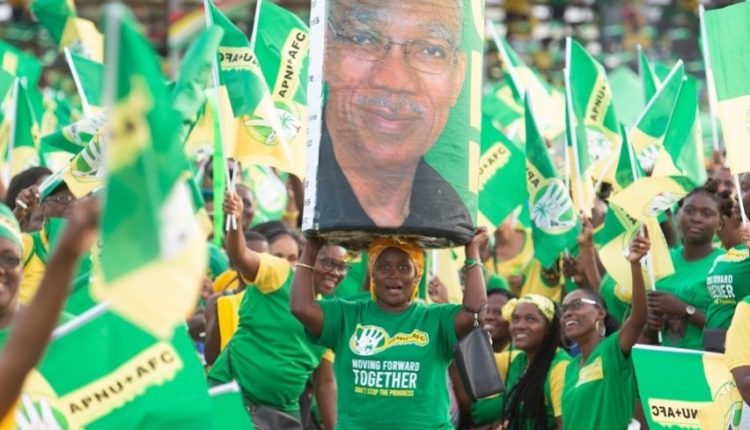The Coalition APNU+AFC on Wednesday afternoon pointed out that the ruling of the Caribbean Court of Justice (CCJ) puts the matter back in the hands of the Guyana Elections Commission (GECOM) but continued to insist on massive fraud.
The CCJ was clear that the issues raised, without evidence, belong to an elections petition in the High Court after a President is sworn in. The figures of the recount show clearly that the PPP has won the elections and Irfaan Ali should be sworn in as President.
“Article 163 provides a constitutionally mandated and evidence based open justice process under the exclusive jurisdiction of the High Court, with the right of appeal, if necessary, to the Court of Appeal and ultimately to this Court,” President of the CCJ, Justice Adrian Saunders said in the Court’s ruling.
“The irregularities complained of by Mr (Joseph) Harmon and alluded to by the CEO (Chief Elections Officer), were required to be addressed under the jurisdiction conferred by Article 163, by an election petition filed in the High Court.
“The Court held that the GECOM Chairperson was right to state that GECOM lacked the legislative authority and the machinery to embark upon a determination of such irregularities,” Justice Saunders added.
Despite the Court’s clear direction, President David Granger defeated first in a No-Confidence Parliamentary vote and now in an election he delayed in calling for over a year beyond the constitutional deadline, insisted that the Coalition has “evidence that there has been massive fraud and irregularities and we will continue the fight to make sure that your votes are counted.”
“The CCJ has not allowed the position that our Court of Appeal has taken but it means that the matter will now have to go back to the Election Commission.
“So the matter is not closed, it now has to go back to the Election Commission,” Granger, not wearing a mask, said during a brief appearance on Main Street, Georgetown to speak with supporters.

The CCJ Wednesday ruled that it is for GECOM to ensure that the Chief Elections Officer Keith Lowenfield submits a report in accordance with the direction he was given.
Lowenfield was on June 16 told by Justice Singh to prepare an elections report with the tabulation of the national vote recount and calculate the Parliamentary seats assigned to each party.
But he failed to do that and relied on a Court of Appeal ruling of June 22 to decide on his own which votes are valid, thereby discarding 115,000 votes and giving APNU+AFC a victory instead of the PPP.
But the CCJ threw out both the Court of Appeal’s decision and Lowenfield’s.
“It was inconsistent with the constitutional framework for the CEO (Lowenfield) or GECOM to disenfranchise tens of thousands of electors in a seemingly non-transparent and arbitrary manner…,” Justice Saunders stated.
In the judgment of the CCJ, Justice Saunders recognised and re-affirmed its duty as Guyana’s final court of appeal to ensure adherence to the Constitution.
Justice Saunders noted that during the recount process, Mr Joseph Harmon, an Election Agent of the APNU+AFC alliance wrote several letters to GECOM alleging anomalies, irregularities, voter impersonation and fraud.
On 13th June the CEO submitted his report. He indicated that votes that were cast and counted for each List of Candidates, but he also drew attention to what he considered to be widespread irregularities. He took it upon himself to indicate that votes contained in any ballot box in which he found an irregularity should be subtracted from the total votes cast and previously counted. It was his assessment that it could not be ascertained that the results for the Districts met the standard of fair and credible elections.
On receiving this report, the GECOM Chairperson conferred with the GECOM Commissioners and announced publicly that some of the allegations set out in the CEO’s report were serious, but the Commission did not have the machinery to adjudicate them.
The Commission, she noted, lacked the powers of a Court of Law to examine and re-examine witnesses or to procure official documents to determine the truth of the allegations.
The Chairperson pointed out that the Constitution had vested in the High Court an exclusive jurisdiction to determine the legality of an election and the Commission could not arrogate onto itself the power to annul elections.
The article was first published by News Room




